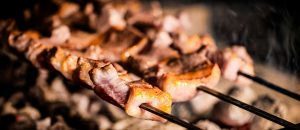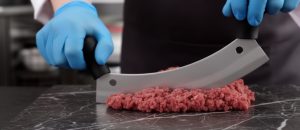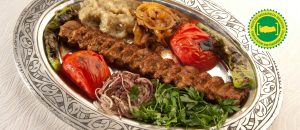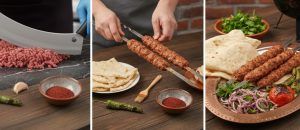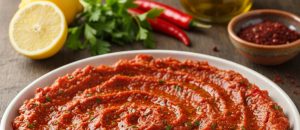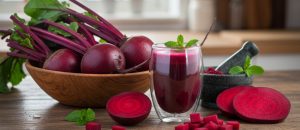Shish Kebap, in its tender perfection and rich flavor, owes much of its allure to the ancient, yet scientifically profound, art of marination. Far from being a mere flavor bath, a well-crafted marinade acts as a complex chemical and physical transformer, tenderizing meat, infusing it with aromatic compounds, and even influencing its browning during grilling. This in-depth article, a vital Cluster Content piece supporting our “Shish Kebap: Anatolia’s Culinary Legacy” Pillar Page, will delve into the fascinating science behind these transformations. For food historians, culinary scientists, and ambitious home chefs, we will explore the molecular effects of acids like yogurt, the proteolytic action of enzymes from ingredients like onion, the role of oil in flavor diffusion, and how spices chemically infuse meat, ultimately enhancing the Maillard reaction. Join us as we uncover the unseen architecture of flavor, understanding why the humble marinade is the unseen architect of Shish Kebap’s enduring appeal.
The Alchemy of Flavor: Unveiling the Science Behind Kebab Marinades
Marination, a culinary practice spanning millennia, is a sophisticated interplay of chemical and physical processes that collectively transform raw meat into tender, flavorful Shish Kebap. It is far more than simply soaking meat in liquid; it is an alchemical process designed to optimize texture, taste, and cooking performance.
Beyond Taste: The Multifunctional Role of Marination
Marination serves multiple critical functions beyond just adding flavor, fundamentally altering the meat’s structure and behavior during cooking.
- Tenderization: One of the primary roles of a marinade is to break down tough muscle fibers and connective tissues, making the meat more tender and palatable. This can occur through acidic or enzymatic action.
- Flavor Infusion: Marinades allow various aromatic compounds from spices, herbs, and other ingredients to penetrate the meat, infusing it with complex flavors that go beyond surface seasoning.
- Moisture Retention: Ingredients like oil or yogurt can help create a barrier that reduces moisture loss during high-heat grilling, keeping the kebab juicy. Some marinades also enhance the meat’s water-holding capacity.
- Color and Browning: Sugars and amino acids present in some marinades can contribute to more desirable browning (Maillard reaction) during cooking, enhancing the visual appeal and flavor.
- Antimicrobial Properties: Historically, acidic marinades also had antimicrobial properties, aiding in the preservation of meat.
Our Scientific Journey: Decoding Shish Kebap Marinades
This article will embark on a scientific journey to decode the molecular secrets behind Shish Kebap marinades, exploring how each component contributes to the final culinary masterpiece.
- Acidic Effects: We will analyze how ingredients like yogurt, lemon juice, or vinegar chemically tenderize meat.
- Enzymatic Breakdown: The role of natural enzymes from fruits or vegetables (e.g., onion) in softening meat will be explained.
- Oil’s Contribution: The physical properties of oil in facilitating flavor transfer and retaining moisture will be examined.
- Spice Chemistry: How fat-soluble and water-soluble compounds from spices infuse meat and enhance complex flavor development will be discussed.
- Salt’s Complexities: The nuanced impact of salt on meat texture and juiciness will be detailed.
- Regional Diversity: We will connect these scientific principles to the rich tapestry of regional Shish Kebap marinades in Turkey.
Acidic Marinades: pH, Protein Denaturation, and Tenderization
Acidic ingredients are among the most common components in Shish Kebap marinades, and their effectiveness lies in their ability to alter the meat’s pH, leading to protein denaturation and subsequent tenderization. This chemical process is a cornerstone of many traditional marinades, particularly those using yogurt or lemon.
The Role of Acids (Yogurt, Lemon, Vinegar) in Meat Tenderization
Acids tenderize meat primarily by denaturing (unfolding) its muscle proteins, making the muscle fibers looser and more susceptible to moisture absorption.
- pH Reduction: Acids in marinades (e.g., lactic acid in yogurt, citric acid in lemon, acetic acid in vinegar) lower the pH of the meat’s surface.
- Protein Denaturation: This lower pH causes the meat’s proteins to unwind from their tightly coiled structures. This denaturation loosens the muscle fibers, making them less rigid.
- Swelling and Water Retention: As proteins denature, they can actually swell and absorb more water. This is crucial for juiciness, as the meat holds onto more moisture during cooking.
- Collagen Breakdown (Minor): While primarily affecting muscle fibers, very strong acids over extended periods can also begin to break down some of the connective tissue (collagen), further contributing to tenderness. However, this is a delicate balance.
- Flavor Penetration: The altered structure of the meat due to acid also allows flavor molecules from the marinade to penetrate more deeply into the muscle tissue.
Balancing Acidity: Preventing Toughness and Maintaining Juiciness
While acids are excellent tenderizers, their use requires a delicate balance; excessive acidity or prolonged exposure can actually make meat tough and dry.
- Over-Denaturation: If the pH drops too low or the meat is left in an acidic marinade for too long, the proteins can denature excessively, causing them to shrink and squeeze out moisture. This results in a tough, rubbery texture, often described as “cooked” by acid (like ceviche).
- Short Exposure for Delicate Meats: Delicate meats like chicken require shorter marination times in acidic marinades (e.g., 30 minutes to 2 hours) to avoid over-tenderization or textural degradation.
- Longer for Tougher Cuts: Tougher cuts of lamb or beef can benefit from longer acidic marination (e.g., 4-8 hours, or even overnight for very tough cuts), but careful monitoring is still essential.
- Yogurt’s Gentle Action: Yogurt is a particularly popular choice for Shish Kebap marinades because its lactic acid is milder than citrus or vinegar. The fats and proteins in yogurt also provide a protective coating, preventing the meat from drying out and contributing to a creamy texture. This makes yogurt-based marinades (e.g., for Chicken Shish) very forgiving and effective.
- Salt’s Interplay: Salt is often added to acidic marinades, but its timing is crucial. Salt can draw out moisture (osmosis), so it’s sometimes added closer to cooking or after the main acidic tenderization, to avoid a dry result.
Enzymatic Action: Nature’s Tenderizers at Work
Beyond acids, certain natural ingredients contain proteolytic enzymes that can effectively tenderize meat by breaking down its proteins. This biological process offers another powerful mechanism for improving the texture of Shish Kebap, providing a more gentle and targeted form of tenderization compared to purely acidic methods.
Proteolytic Enzymes: How Onion, Papaya, and Kiwi Break Down Meat
Proteolytic enzymes are biological catalysts that break down proteins into smaller peptides and amino acids, directly impacting meat tenderness.
- Onion (Allium cepa): Onions, a common ingredient in many Turkish marinades, contain a group of enzymes that can contribute to tenderization. When grated or juiced, the enzymes are released and can interact with the meat’s proteins. Onion juice also adds a subtle sweetness and flavor.
- Papain (from Papaya): Papaya contains the enzyme papain, a powerful proteolytic enzyme. It effectively breaks down muscle fibers and connective tissues. Papain is often used in commercial meat tenderizers.
- Actinidin (from Kiwi): Kiwi fruit contains actinidin, another potent proteolytic enzyme. It is highly effective at breaking down meat proteins.
- Bromelain (from Pineapple): Pineapple contains bromelain, an enzyme that also breaks down proteins.
- Mechanism: These enzymes work by cleaving the peptide bonds within the long protein chains of muscle fibers and collagen. This weakens the meat’s structure, resulting in a more tender product.
- Usage in Kebab: In Shish Kebap marinades, grated onion or onion juice is the most traditional enzymatic tenderizer, offering both tenderizing effects and flavor. While papaya, kiwi, or pineapple are highly effective, they are less common in traditional Turkish kebab marinades due to their distinct flavor profiles which might not suit the desired taste.
Controlled Enzyme Activity: Timing and Concentration
The effectiveness of enzymatic tenderization is highly dependent on controlling the enzyme’s activity, which involves careful management of timing, concentration, and temperature.
- Concentration: The amount of enzyme-rich ingredient used is crucial. Too much, and the meat can become mushy or overly soft, losing its desirable texture. Too little, and it may not tenderize effectively.
- Timing: Enzymes continue to work as long as they are active. Therefore, the marination time needs to be carefully controlled.
- Short Duration: For potent enzymes like papain or bromelain, marination times can be as short as 30 minutes to 2 hours for smaller pieces of meat.
- Longer for Milder Enzymes: Milder enzymes, such as those in onion, allow for longer marination periods (e.g., 4-8 hours or overnight), which also allows more time for flavor infusion.
- Temperature: Enzyme activity is temperature-dependent. They are most active at warm temperatures but can also work effectively at refrigerator temperatures, albeit more slowly. Marinating in the refrigerator is generally recommended to prevent bacterial growth while still allowing tenderization.
- Stopping Activity: Enzymes can be deactivated by heat (cooking) or by removing the enzyme source (e.g., rinsing off a pineapple marinade). For Shish Kebap, the cooking process itself stops further enzymatic breakdown.
- Balance: The goal is a delicate balance: tenderize the meat without degrading its texture to an undesirable mushy state. This requires experience and careful attention to the type of enzyme and marination parameters.
Oil-Based Marinades: Flavor Infusion and Moisture Retention
Oil is a cornerstone of many Shish Kebap marinades, playing crucial roles in both infusing flavor and physically protecting the meat to retain moisture during high-heat grilling. Its physical and chemical properties make it an indispensable component for achieving succulent and aromatic kebabs.
The Physics of Oil: Coating, Sealing, and Heat Transfer
Oil’s physical properties are vital for how it interacts with meat during marination and cooking, affecting moisture and heat dynamics.
- Coating and Sealing: Oil, being hydrophobic, creates a thin film around the meat pieces. This coating acts as a physical barrier that helps to seal in the meat’s natural moisture, reducing water loss through evaporation during grilling. This is particularly important for preventing drying out on an open flame.
- Heat Transfer: Oil has a high smoke point (e.g., olive oil) and can act as an efficient medium for heat transfer. When meat coated in oil hits a hot grill, the oil quickly heats up, transferring heat rapidly to the meat’s surface, contributing to a quick sear and crispy crust (Maillard reaction).
- Preventing Sticking: The oil coating also helps prevent the meat from sticking to the grill grates or skewers, ensuring easier handling and cleaner grill marks.
- Lubrication: Within the marinade, oil lubricates the meat pieces, making them easier to handle and allowing other marinade components to distribute more evenly.
Fat-Soluble Flavors: How Spices Penetrate with Oil
Oil’s chemical property as a solvent for fat-soluble compounds is essential for infusing Shish Kebap with deep and complex flavors from spices and aromatics.
- Solvent for Flavor Compounds: Many key flavor compounds in spices (e.g., capsaicin in chili, terpenes in oregano and thyme, allicin precursors in garlic) are fat-soluble. This means they dissolve readily in oil but not in water.
- Enhanced Penetration: When spices are mixed with oil in a marinade, the oil acts as a carrier, helping these fat-soluble flavor molecules to penetrate the lipid (fat) portions of the meat. While water-soluble flavors primarily affect the surface, oil allows for deeper flavor infusion into the meat’s interior.
- Aromatic Preservation: Oil can also help to preserve volatile aromatic compounds in herbs and spices, protecting them from oxidation and evaporation before cooking, ensuring a more potent flavor when the meat hits the heat.
- Flavor Layering: By using an oil-based marinade, Shish Kebap gains a layer of flavor that is both surface-level (from direct seasoning) and deeply infused (from fat-soluble compounds carried by the oil), contributing to a more complex and satisfying taste experience. Good quality olive oil, a staple in Mediterranean and Anatolian cooking, not only acts as a solvent but also imparts its own fruity, peppery notes to the kebab.
Spices and Aromatics: The Chemistry of Flavor Infusion
Spices and aromatics are the soul of Shish Kebap marinades, contributing complex flavor profiles and enhancing the overall culinary experience through intricate chemical interactions. Their effectiveness depends on their solubility, diffusion rates, and their role in facilitating key browning reactions during cooking. Understanding this chemistry allows for a more deliberate and masterful application of seasoning.
Solubility and Diffusion: Getting Flavors into the Meat
The ability of flavor compounds from spices to penetrate meat is governed by their solubility (in water or fat) and the process of diffusion.
- Water-Soluble Compounds: Many flavor compounds (e.g., some salts, sugars, and certain herb components) are water-soluble. These primarily affect the surface of the meat and penetrate the aqueous (water) phases between muscle fibers. Their diffusion is relatively fast but mostly superficial.
- Fat-Soluble Compounds: As previously discussed, many potent flavor compounds (e.g., from paprika, oregano, garlic) are fat-soluble. This is where oil in a marinade becomes crucial, acting as a carrier to transport these flavors into the fatty tissues and potentially deeper into the meat.
- Diffusion: Flavor molecules move from an area of higher concentration (the marinade) to an area of lower concentration (the meat). This process is slow.
- Time: Longer marination times allow more time for diffusion, resulting in deeper flavor penetration.
- Surface Area: Smaller pieces of meat (like those in Shish Kebap) and increased surface area (through cuts or scoring) facilitate faster and deeper diffusion.
- Osmosis (Salt’s Role): Salt, while a flavor enhancer, also plays a role in osmosis, drawing out some moisture from the meat. This extracted moisture can then re-enter the meat, carrying dissolved flavor compounds with it, effectively enhancing flavor infusion.
Maillard Reaction Enhancers: Sugars and Amino Acids in Marinades
Certain components within marinades can act as precursors or enhancers for the Maillard reaction, contributing to the desirable browning and complex flavors of grilled Shish Kebap.
- Amino Acids: Meat naturally contains amino acids (from proteins). Marinades that include ingredients rich in additional amino acids (e.g., yogurt, onion juice, soy sauce in non-traditional kebabs) provide more reactants for the Maillard reaction.
- Reducing Sugars: The Maillard reaction specifically requires reducing sugars (e.g., glucose, fructose). While meat contains some natural sugars, marinades often introduce additional sugars.
- Onion Juice: Onions contain natural sugars that contribute to the Maillard reaction.
- Yogurt: Lactic acid fermentation in yogurt can produce some reducing sugars.
- Honey/Molasses (less common for traditional Shish): In some non-traditional or sweeter kebab marinades, small amounts of honey or pomegranate molasses might be used, which are rich in sugars that significantly enhance browning.
- Enhanced Browning and Flavor: The presence of these precursors in the marinade, when the meat hits the high heat of the grill, accelerates and intensifies the Maillard reaction. This leads to a richer, darker brown crust and a more profound development of savory, roasted, and umami flavors on the surface of the Shish Kebap. This chemical synergy ensures that the exterior of the kebab is as flavorful as its juicy interior.
Salt’s Dual Role: Seasoning, Brining, and Protein Restructuring
Salt, often overlooked beyond its seasoning capability, plays a complex and multifaceted scientific role in Shish Kebap marinades, affecting both flavor and crucial aspects of meat texture and juiciness. Its interaction with meat proteins and moisture requires careful timing and concentration.
Osmosis and Moisture: When Salt Draws Water Out or In
Salt’s interaction with meat’s moisture content is a delicate balance, governed by osmosis, which can either draw water out or, paradoxically, help retain it.
- Drawing Moisture Out (Initial Effect): When salt is applied directly to meat, it initially causes water to move out of the meat cells and into the marinade (or onto the surface) through osmosis (water moving from a lower to higher salt concentration). This can lead to a drier product if left for too long or if salt concentration is too high without other components.
- Brining Effect (Later Effect): However, if the meat is left in a moderately salty marinade for an extended period, the salt begins to dissolve muscle proteins (myosin). This dissolution allows the meat to reabsorb more water, increasing its water-holding capacity. This is essentially the brining effect.
- Increased Juiciness: This improved water retention means the meat loses less moisture during cooking, resulting in a significantly juicier Shish Kebap.
- Timing of Salt: Due to this dual effect, some chefs prefer to add salt to the marinade either just before cooking (to avoid initial dehydration) or to use a marinade with a lower salt concentration for longer periods, allowing the brining effect to take hold slowly.
Protein Restructuring: Enhancing Juiciness and Texture (Brining Effect)
Beyond its role in osmosis, salt directly interacts with meat proteins, leading to a restructuring that enhances both juiciness and texture.
- Protein Solubilization: Salt (specifically sodium ions) helps to solubilize certain muscle proteins, particularly myosin. When these proteins dissolve, they unravel slightly and become more capable of holding onto water molecules.
- Gel Formation: The solubilized and restructured proteins form a kind of gel matrix within the meat. This matrix traps moisture more effectively, preventing it from escaping during the heating process.
- Improved Texture: This protein restructuring also contributes to a more tender and cohesive texture. The meat feels less “stringy” and more succulent.
- Cohesiveness: For minced meat kebabs (like Adana Kebabı, which is sometimes grilled on Shish), salt is absolutely crucial for creating the sticky, cohesive texture that allows the mince to adhere firmly to the skewer without falling off. For chunked Shish Kebap, it helps the individual pieces remain plump and juicy.
- Impact on Cooked Meat: The overall result of salt’s strategic application is a Shish Kebap that is not only perfectly seasoned but also noticeably juicier, more tender, and has a more desirable texture than unmarinated or improperly salted meat.
Regional Marinade Variations in Shish Kebap: A Scientific Look at Tradition
The principles of marinade science are universally applicable, yet their manifestation in Shish Kebap traditions across Anatolia reveals fascinating regional variations. These differences are not arbitrary; they are often rooted in local ingredient availability, historical influences, and a deep, intuitive understanding of how specific components chemically interact with different types of meat to achieve a desired flavor and texture.
Anatolian Secrets: From Yogurt to Tomato Pastes
Across Anatolia, Shish Kebap marinades showcase a diverse range of traditional ingredients, each chosen for its specific scientific contribution to flavor and tenderness.
- Yogurt-Based Marinades (Especially for Chicken and Lamb):
- Regions: Widely popular across Turkey, particularly for Tavuk Shish (Chicken Shish) and certain lamb preparations.
- Science: Yogurt’s lactic acid provides mild tenderization by gently denaturing proteins, preventing the meat from becoming tough. The fat and milk solids in yogurt also act as an insulating layer, helping to retain moisture during grilling. Furthermore, yogurt contributes a creamy texture and a subtle tangy flavor that complements poultry and lamb beautifully. It’s a forgiving marinade that rarely over-tenderizes.
- Olive Oil and Herb Marinades (Aegean, Mediterranean):
- Regions: Prevalent in the Aegean and Mediterranean coastal regions where olive oil is abundant.
- Science: Olive oil, rich in monounsaturated fats, helps infuse fat-soluble flavor compounds from herbs (oregano, thyme, rosemary) deeper into the meat. It also forms a protective barrier to reduce moisture loss and promotes a good sear. The fresh herbs provide volatile aromatic compounds that add a clean, bright flavor profile.
- Onion Juice and Tomato Paste Marinades (Southeastern, Central Anatolia):
- Regions: Common in areas renowned for meat dishes like Adana, Urfa, and parts of Central Anatolia.
- Science: Onion juice contains natural proteolytic enzymes that gently tenderize the meat, along with sugars that aid in the Maillard reaction for better browning. Tomato paste provides a savory umami base, natural acids for tenderization, and sugars for browning. Its deep flavor melds well with lamb and beef. Sometimes red pepper paste is also included for color and heat, bringing its own fat-soluble flavor compounds.
Matching Marinade to Meat Type: A Scientific Approach to Regional Flavors
Traditional Anatolian kebab masters intuitively understood the scientific principle of matching the marinade composition to the specific type and cut of meat to achieve optimal results.
- Tougher Cuts of Beef/Lamb: For tougher cuts, marinades with stronger acidic components (lemon, vinegar) or potent enzymatic agents (onion juice) might be used for longer durations to break down connective tissues and muscle fibers more effectively. The aim is significant tenderization.
- Leaner Meats (Chicken Breast, Beef Tenderloin): Leaner meats, which are prone to drying out, benefit from oil-rich marinades or yogurt-based marinades that help retain moisture and protect the delicate proteins from overcooking. Shorter marination times are crucial to avoid turning them mushy.
- Fatty Lamb: For fatty lamb (the traditional choice for Shish Kebap), marinades often focus less on tenderization and more on flavor infusion (herbs, spices) and promoting a good crust, as the fat itself provides much of the juiciness.
- Regional Specialization: Each region’s unique Shish Kebap often reflects an evolved, scientific understanding of how to treat their specific local meat and available produce. For example, the use of predominantly lamb with rich, spicy pastes in the Southeast, or lighter, more herbaceous marinades in the Aegean for smaller lamb cuts, showcases this intuitive culinary science. This synergy between regional resources and time-tested methods defines the diverse “flavor maps” of Shish Kebap across Turkey.
Marinade Science – The Unseen Architect of Shish Kebap’s Flavor
Our scientific deep dive into “Marinade Science: How Acids, Enzymes, and Spices Transform Shish Kebap” reveals that marination is a sophisticated culinary technique, functioning as the unseen architect of this beloved dish’s tender texture and rich flavor. We’ve explored the precise molecular interactions of acidic components like yogurt and lemon, which gently denature proteins, and the potent proteolytic enzymes from ingredients like onion, which effectively tenderize meat. Furthermore, we’ve examined the crucial role of oil in carrying fat-soluble flavor compounds and sealing in moisture, alongside how spices and aromatics chemically infuse the meat and enhance the Maillard reaction for a perfect crust. Finally, salt’s complex dual action of seasoning and protein restructuring proves its indispensable contribution to juiciness. The rich tapestry of regional Shish Kebap marinades across Anatolia stands as a testament to centuries of intuitive culinary science, where tradition and scientific understanding converge to transform simple ingredients into a timeless gastronomic masterpiece.








